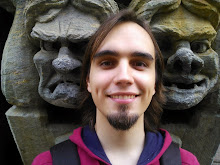It is overwhelming.
We constantly live lives of others, holographically dreaming collective dreams, and sometimes attempting to make our dreams dominate over those of others or submitting ourselves to others' dreams. When a client visits a therapist or a healer or a shaman, two life stories meet, and these stories are shared both in gross and subtler dimensions of being-in-the-world; and the shaman's job is to emphatically embrace the totality of suffering in the other, virtually live it through in some translocal and transtemporal realm of one's own embodied universal consciousness as a sum of perspectives that are available so as to look and feel into the being of the individual, not get convinced in a false idea of the person that his or her life story story is absolute truth of what the world is (the myth of the given), offer in exchange one's own story of truth and liberation that at some point must be wide enough so as to embrace the entire Kosmos, and to be completely liberated from the story itself while fully embodying it as profoundly as one can. You need to be liberated in order to give space for the story's healthy development and evolution; and you need to be fully present as an embodiment of this story in order to support creation of the morphic field of such an altitude of consciousness (and actually have fun). And if you are good and honest with yourself, you can offer nothing nothing else than the story of integrally liberated universal being.
Even though I am in the initial phase of the practice in some ways, as I increasingly get in touch with subtle dynamics I start to feel the totality of blockages and pains and sufferings of sentient beings around. I feel how we virtually strangulate each other, inserting one another into one's own partial and limited life story of who we are as human beings and what life is about. All I can do is giving space to these sufferings in my own consciousness because there is ultimately no separation, we are all intertwined. And often it is overwhelming; and there is nowhere to hide from the fiery light of truthful seeing, hearing, feeling, and being.
I offer my Soul to the path of liberation of the Kosmos as a living total-unity; and I silently pray to the Divine for the grace and grit. I need to embody courage, strength and will as well as compassion and wisdom to manifest the deepest potentials of consciousness that offer treasures beyond any price.
I conclude with my favorite quotation from the splendid American Beauty movie that one is ought to watch at some point in life.
Ricky Fitts: It was one of those days when it's a minute away from snowing and there's this electricity in the air, you can almost hear it. And this bag was, like, dancing with me. Like a little kid begging me to play with it. For fifteen minutes. And that's the day I knew there was this entire life behind things, and... this incredibly benevolent force, that wanted me to know there was no reason to be afraid, ever. Video's a poor excuse, I know. But it helps me remember... and I need to remember... Sometimes there's so much beauty in the world I feel like I can't take it, like my heart's going to cave in.



